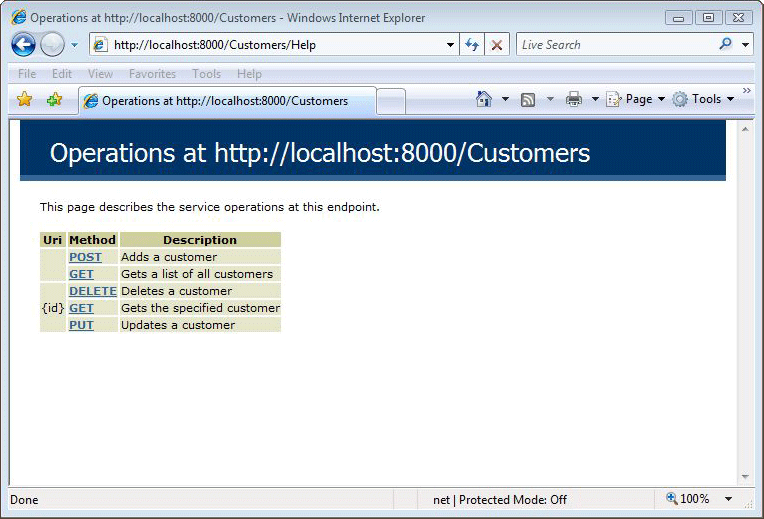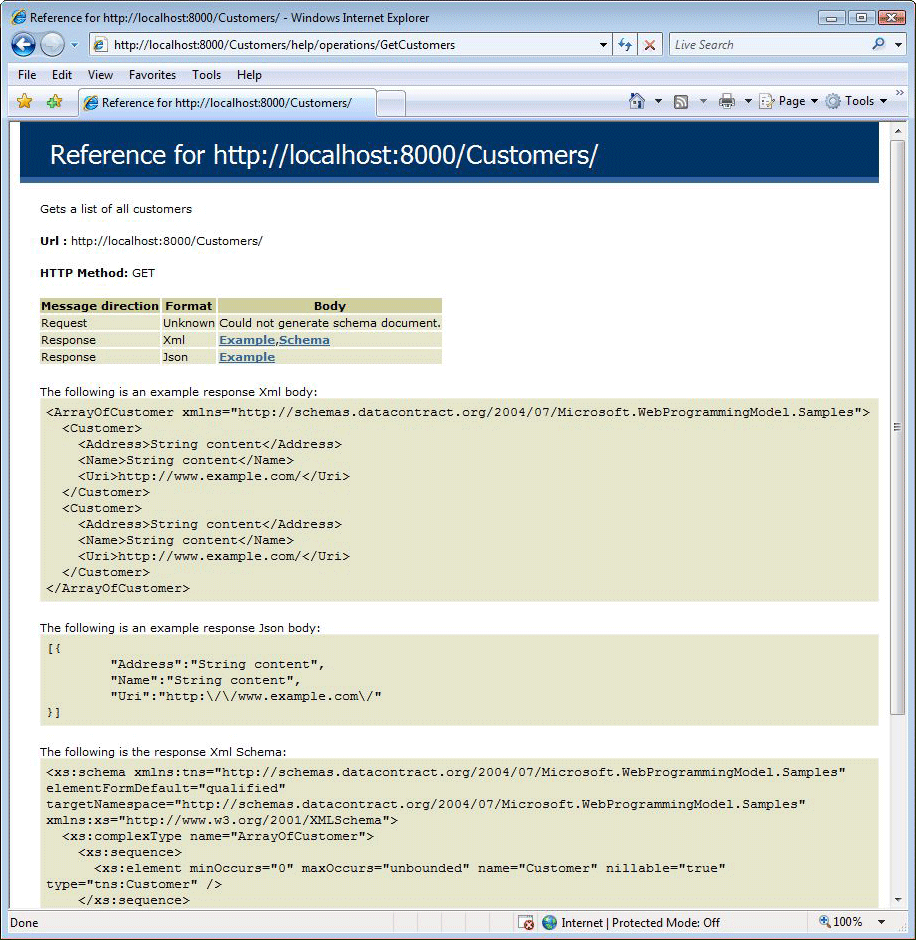Usługa HTTP w sieci Web dla programu WCF — strona pomocy
Program .NET Framework 4.6.1 udostępnia automatyczną stronę pomocy dla usług HTTP sieci Web WCF. Ta strona pomocy zawiera opis każdej operacji, formatów żądań i odpowiedzi oraz schematów. Ta funkcja jest domyślnie wyłączona. Gdy użytkownik przechodzi do usługi HTTP sieci Web WCF i dołącza ciąg "/Help" na końcu adresu URL, na przykład http://localhost:8000/Customers/Help, zostanie wyświetlona strona pomocy podobna do poniższej.

Następnie użytkownik może kliknąć dowolną metodę wymienioną na stronie pomocy i szczegółową stronę dla tej operacji, wyświetlającą więcej informacji o metodzie, w tym formaty komunikatów i przykładowe odpowiedzi. Na poniższej ilustracji przedstawiono przykład strony pomocy dla metody .

Korzystanie ze strony pomocy protokołu HTTP sieci Web programu WCF
Na stronie Pomocy HTTP sieci Web programu WCF jest wyświetlany krótki opis każdej operacji podanej przy użyciu elementu DescriptionAttribute. Ten atrybut przyjmuje ciąg zawierający krótki opis operacji, do którego jest stosowany. Na przykład poniższy kod pokazuje, jak użyć elementu , DescriptionAttribute aby podać krótki opis.
[OperationContract]
[WebGet(UriTemplate="/template1", BodyStyle = WebMessageBodyStyle.Bare)]
[Description("Description for GET /template1")]
SyndicationFeedFormatter GetTemplate1();
Aby włączyć stronę Pomocy PROTOKOŁU HTTP sieci Web WCF, należy dodać zachowanie punktu końcowego do punktów końcowych usługi. Można to zrobić w konfiguracji lub kodzie. Aby włączyć wiek pomocy HTTP sieci Web WCF w konfiguracji, dodaj zachowanie punktu końcowego z elementem <webHttp> , ustaw wartość helpEnabled truei dodaj punkt końcowy i skonfiguruj go do korzystania z zachowania punktu końcowego. Poniższy kod konfiguracji pokazuje, jak to zrobić.
<endpointBehaviors>
<behavior name="RESTEndpointBehavior">
<webHttp helpEnabled="true"/>
</behavior>
</endpointBehaviors>
<!-- ... -->
<services>
<service behaviorConfiguration="RESTWebServiceBehavior" name="RESTWebService"> <endpoint address="" kind="webHttpEndpoint" behaviorConfiguration="RESTEndpointBehavior" contract="IHello" />
<!-- ... -->
</service>
</services>
Aby włączyć stronę Pomocy http sieci Web programu WCF w kodzie, dodaj punkt końcowy usługi i dodaj element WebHttpBehavior do ustawienia HelpEnabled punktu końcowego na true. Poniższy kod pokazuje, jak to zrobić.
using (WebServiceHost host = new WebServiceHost(typeof(Service), new Uri("http://localhost:8000/Customers")))
{
host.AddServiceEndpoint(typeof(ICustomerCollection), new WebHttpBinding(), "");
host.Description.Endpoints[0].Behaviors.Add(new WebHttpBehavior { EnableHelp = true });
// ...
}
Strona pomocy jest oparta na języku XHTML z znacznikami identyfikującymi różne części strony. Dzięki temu klienci mogą programowo uzyskiwać dostęp do strony przy użyciu XElement lub innych interfejsów API XLinq.
Schematy używane na stronie pomocy internetowej usługi HTTP programu WCF
Poniższe schematy są używane na stronie pomocy internetowej usługi HTTP programu WCF.
<?xml version="1.0" encoding="utf-16"?>
<xs:schema xmlns:tns="http://schemas.microsoft.com/2003/10/Serialization/" attributeFormDefault="qualified" elementFormDefault="qualified" targetNamespace="http://schemas.microsoft.com/2003/10/Serialization/" xmlns:xs="http://www.w3.org/2001/XMLSchema">
<xs:element name="anyType" nillable="true" type="xs:anyType" />
<xs:element name="anyURI" nillable="true" type="xs:anyURI" />
<xs:element name="base64Binary" nillable="true" type="xs:base64Binary" />
<xs:element name="boolean" nillable="true" type="xs:boolean" />
<xs:element name="byte" nillable="true" type="xs:byte" />
<xs:element name="dateTime" nillable="true" type="xs:dateTime" />
<xs:element name="decimal" nillable="true" type="xs:decimal" />
<xs:element name="double" nillable="true" type="xs:double" />
<xs:element name="float" nillable="true" type="xs:float" />
<xs:element name="int" nillable="true" type="xs:int" />
<xs:element name="long" nillable="true" type="xs:long" />
<xs:element name="QName" nillable="true" type="xs:QName" />
<xs:element name="short" nillable="true" type="xs:short" />
<xs:element name="string" nillable="true" type="xs:string" />
<xs:element name="unsignedByte" nillable="true" type="xs:unsignedByte" />
<xs:element name="unsignedInt" nillable="true" type="xs:unsignedInt" />
<xs:element name="unsignedLong" nillable="true" type="xs:unsignedLong" />
<xs:element name="unsignedShort" nillable="true" type="xs:unsignedShort" />
<xs:element name="char" nillable="true" type="tns:char" />
<xs:simpleType name="char">
<xs:restriction base="xs:int" />
</xs:simpleType>
<xs:element name="duration" nillable="true" type="tns:duration" />
<xs:simpleType name="duration">
<xs:restriction base="xs:duration">
<xs:pattern value="\-?P(\d*D)?(T(\d*H)?(\d*M)?(\d*(\.\d*)?S)?)?" />
<xs:minInclusive value="-P10675199DT2H48M5.4775808S" />
<xs:maxInclusive value="P10675199DT2H48M5.4775807S" />
</xs:restriction>
</xs:simpleType>
<xs:element name="guid" nillable="true" type="tns:guid" />
<xs:simpleType name="guid">
<xs:restriction base="xs:string">
<xs:pattern value="[\da-fA-F]{8}-[\da-fA-F]{4}-[\da-fA-F]{4}-[\da-fA-F]{4}-[\da-fA-F]{12}" />
</xs:restriction>
</xs:simpleType>
<xs:attribute name="FactoryType" type="xs:QName" />
<xs:attribute name="Id" type="xs:ID" />
<xs:attribute name="Ref" type="xs:IDREF" />
</xs:schema>
<?xml version="1.0" encoding="utf-16"?>
<xs:schema xmlns:tns="http://microsoft.com/wsdl/types/" elementFormDefault="qualified" targetNamespace="http://microsoft.com/wsdl/types/" xmlns:xs="http://www.w3.org/2001/XMLSchema">
<xs:simpleType name="guid">
<xs:restriction base="xs:string">
<xs:pattern value="[0-9a-fA-F]{8}-[0-9a-fA-F]{4}-[0-9a-fA-F]{4}-[0-9a-fA-F]{4}-[0-9a-fA-F]{12}" />
</xs:restriction>
</xs:simpleType>
<xs:simpleType name="char">
<xs:restriction base="xs:unsignedShort" />
</xs:simpleType>
</xs:schema>
<?xml version="1.0" encoding="utf-16"?>
<xs:schema xmlns:tns="http://schemas.datacontract.org/2004/07/System" elementFormDefault="qualified" targetNamespace="http://schemas.datacontract.org/2004/07/System" xmlns:xs="http://www.w3.org/2001/XMLSchema">
<xs:import namespace="http://schemas.microsoft.com/2003/10/Serialization/" />
<xs:complexType name="DateTimeOffset">
<xs:annotation>
<xs:appinfo>
<IsValueType xmlns="http://schemas.microsoft.com/2003/10/Serialization/">true</IsValueType>
</xs:appinfo>
</xs:annotation>
<xs:sequence>
<xs:element name="DateTime" type="xs:dateTime" />
<xs:element name="OffsetMinutes" type="xs:short" />
</xs:sequence>
</xs:complexType>
<xs:element name="DateTimeOffset" nillable="true" type="tns:DateTimeOffset" />
<xs:complexType name="DBNull">
<xs:sequence />
</xs:complexType>
<xs:element name="DBNull" nillable="true" type="tns:DBNull" />
</xs:schema>
<?xml version="1.0" encoding="utf-16"?>
<xs:schema xmlns:tns="http://schemas.microsoft.com/2003/10/Serialization/Arrays" xmlns:ser="http://schemas.microsoft.com/2003/10/Serialization/" elementFormDefault="qualified" targetNamespace="http://schemas.microsoft.com/2003/10/Serialization/Arrays" xmlns:xs="http://www.w3.org/2001/XMLSchema">
<xs:import namespace="http://schemas.microsoft.com/2003/10/Serialization/" />
<xs:complexType name="ArrayOfboolean">
<xs:sequence>
<xs:element minOccurs="0" maxOccurs="unbounded" name="boolean" type="xs:boolean" />
</xs:sequence>
</xs:complexType>
<xs:element name="ArrayOfboolean" nillable="true" type="tns:ArrayOfboolean" />
<xs:complexType name="ArrayOfchar">
<xs:sequence>
<xs:element minOccurs="0" maxOccurs="unbounded" name="char" type="ser:char" />
</xs:sequence>
</xs:complexType>
<xs:element name="ArrayOfchar" nillable="true" type="tns:ArrayOfchar" />
<xs:complexType name="ArrayOfdateTime">
<xs:sequence>
<xs:element minOccurs="0" maxOccurs="unbounded" name="dateTime" type="xs:dateTime" />
</xs:sequence>
</xs:complexType>
<xs:element name="ArrayOfdateTime" nillable="true" type="tns:ArrayOfdateTime" />
<xs:complexType name="ArrayOfdecimal">
<xs:sequence>
<xs:element minOccurs="0" maxOccurs="unbounded" name="decimal" type="xs:decimal" />
</xs:sequence>
</xs:complexType>
<xs:element name="ArrayOfdecimal" nillable="true" type="tns:ArrayOfdecimal" />
<xs:complexType name="ArrayOfdouble">
<xs:sequence>
<xs:element minOccurs="0" maxOccurs="unbounded" name="double" type="xs:double" />
</xs:sequence>
</xs:complexType>
<xs:element name="ArrayOfdouble" nillable="true" type="tns:ArrayOfdouble" />
<xs:complexType name="ArrayOffloat">
<xs:sequence>
<xs:element minOccurs="0" maxOccurs="unbounded" name="float" type="xs:float" />
</xs:sequence>
</xs:complexType>
<xs:element name="ArrayOffloat" nillable="true" type="tns:ArrayOffloat" />
<xs:complexType name="ArrayOfguid">
<xs:sequence>
<xs:element minOccurs="0" maxOccurs="unbounded" name="guid" type="ser:guid" />
</xs:sequence>
</xs:complexType>
<xs:element name="ArrayOfguid" nillable="true" type="tns:ArrayOfguid" />
<xs:complexType name="ArrayOfint">
<xs:sequence>
<xs:element minOccurs="0" maxOccurs="unbounded" name="int" type="xs:int" />
</xs:sequence>
</xs:complexType>
<xs:element name="ArrayOfint" nillable="true" type="tns:ArrayOfint" />
<xs:complexType name="ArrayOflong">
<xs:sequence>
<xs:element minOccurs="0" maxOccurs="unbounded" name="long" type="xs:long" />
</xs:sequence>
</xs:complexType>
<xs:element name="ArrayOflong" nillable="true" type="tns:ArrayOflong" />
<xs:complexType name="ArrayOfshort">
<xs:sequence>
<xs:element minOccurs="0" maxOccurs="unbounded" name="short" type="xs:short" />
</xs:sequence>
</xs:complexType>
<xs:element name="ArrayOfshort" nillable="true" type="tns:ArrayOfshort" />
<xs:complexType name="ArrayOfstring">
<xs:sequence>
<xs:element minOccurs="0" maxOccurs="unbounded" name="string" nillable="true" type="xs:string" />
</xs:sequence>
</xs:complexType>
<xs:element name="ArrayOfstring" nillable="true" type="tns:ArrayOfstring" />
<xs:complexType name="ArrayOfduration">
<xs:sequence>
<xs:element minOccurs="0" maxOccurs="unbounded" name="duration" type="ser:duration" />
</xs:sequence>
</xs:complexType>
<xs:element name="ArrayOfduration" nillable="true" type="tns:ArrayOfduration" />
<xs:complexType name="ArrayOfunsignedInt">
<xs:sequence>
<xs:element minOccurs="0" maxOccurs="unbounded" name="unsignedInt" type="xs:unsignedInt" />
</xs:sequence>
</xs:complexType>
<xs:element name="ArrayOfunsignedInt" nillable="true" type="tns:ArrayOfunsignedInt" />
<xs:complexType name="ArrayOfunsignedLong">
<xs:sequence>
<xs:element minOccurs="0" maxOccurs="unbounded" name="unsignedLong" type="xs:unsignedLong" />
</xs:sequence>
</xs:complexType>
<xs:element name="ArrayOfunsignedLong" nillable="true" type="tns:ArrayOfunsignedLong" />
<xs:complexType name="ArrayOfunsignedShort">
<xs:sequence>
<xs:element minOccurs="0" maxOccurs="unbounded" name="unsignedShort" type="xs:unsignedShort" />
</xs:sequence>
</xs:complexType>
<xs:element name="ArrayOfunsignedShort" nillable="true" type="tns:ArrayOfunsignedShort" />
<xs:complexType name="ArrayOfQName">
<xs:sequence>
<xs:element minOccurs="0" maxOccurs="unbounded" name="QName" nillable="true" type="xs:QName" />
</xs:sequence>
</xs:complexType>
<xs:element name="ArrayOfQName" nillable="true" type="tns:ArrayOfQName" />
</xs:schema>
Aby uzyskać więcej informacji na temat schematu serializacji kontraktu danych, zobacz Dokumentacja schematu kontraktu danych.